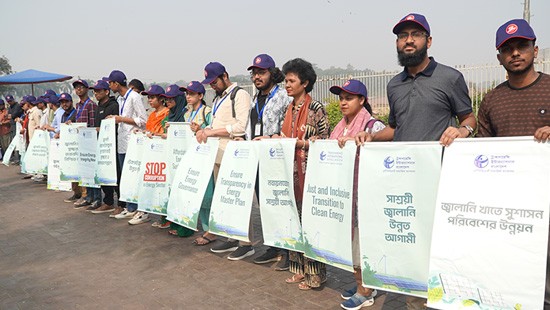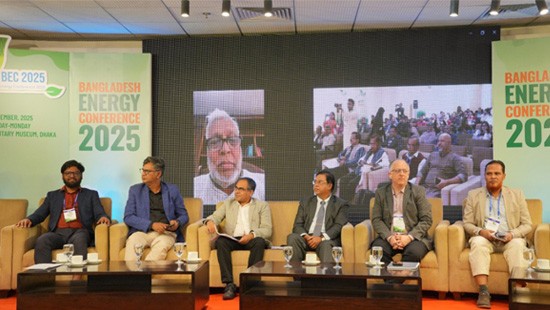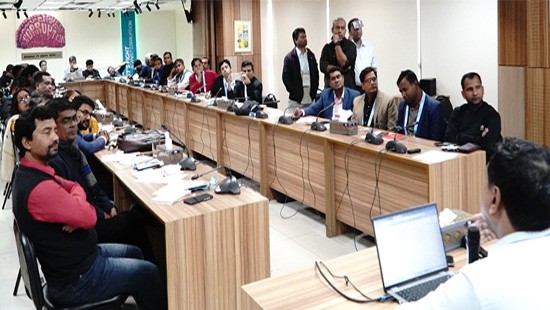Published: 29 September 2019
Flood preparedness and relief efforts this year were marred by irregularities and corruption, including making political considerations when preparing lists of flood victims and distributing relief items, dispensing less relief than the stipulated amount and depriving those who raised their voice against the dishonesty. The discrepancies in the flood preparedness and relief efforts also included insufficient risk assessment of the flood vulnerability, lack of coordination among concerned authorities, misuse of government allocation, lack of initiatives to shift the vulnerable people to safer shelters, inadequate shelters and delicate embankments due to lack of proper maintenance.

These observations were made in a study titled ‘Integrity Watch in Flood 2019 Preparedness and Relief Operations’ by TI Bangladesh. To unveil the study, TI Bangladesh organized a press conference at its Dhaka office on 29 September 2019. TIB Executive Director Dr. Iftekharuzzaman, Adviser-Executive Management Professor Dr. Sumaiya Khair, Senior Programme Managers of Research & Policy (R&P) and Climate Finance Governance (CFG) unit A S M Juel and Zakir Hossain Khan respectively, Deputy Programme Manager-R&P Amit Sarkar were present at the press conference. Md. Mahfuzul Haque, Programme Manager, Climate Finance Policy and Integrity unit, and Md. Newazul Moula, Deputy Programme Manager, CFG of TIB presented the study report at the event.
Dr. Iftekharuzzaman said, “Bangladesh's expertise and reputation in dealing with disaster have gained fame both at home and abroad, and has been recognized as an example. In this context, continual development of the highest excellence of integrity is essential. Bangladesh has gained significant institutional capacity in dealing with disaster and relief activities in the country. This study identified several positive initiatives taken by the government to deal with the floods, however, there was an opportunity for further improvement given overall progress.”
With an aim to identify the institutional limitations in the government’s planning of relief distribution, rehabilitation programmes, emergency response and overall preparedness for such disaster, the study also conducted a survey in 683 thanas in 20 unions of 10 Upazilas of Kurigram, Gaibandha, Jamalpur, Boguraand Sylhet from July 31 to Aug 7 of this year. According to the study, nearly 4 million people were marooned in 28 districts within just 10 to 15 days during the flood season this year, unfortunately leaving 108 people dead.
Referring to the study findings, Dr. Zaman said, “There has been lack of transparency, accountability, equity and public participation in relief activities, as well as the expected coordination of the overall oversight of the administration in dealing with floods and the role of public representatives. Also, there has been a shortage of essential services including shelters, medical treatment, drinking water, sanitation, protection to women, children and especially disabled people as well as domestic animals and household goods in the flood shelters and other flood-affected places.”
Apart from the negative aspects, the study also identified positives initiatives by the government during the flood situation which included, uploading flood-related information on the relevant website regularly, and allocating and distributing rice, dry food, tents, and food for livestock at a limited scale.
 Dr. Zaman also said, according to the survey participants, they could not get the satisfactory service of the government and public representatives due to allegations of distribution of relief in political considerations and nepotism, distribution of rice at a lower proportion than the allotted proportion, in some cases unequal relief based on the identity of the person, reduction of grievance redressal system, use of relief resources in the other sector, including ministerial visitation costs.”
Dr. Zaman also said, according to the survey participants, they could not get the satisfactory service of the government and public representatives due to allegations of distribution of relief in political considerations and nepotism, distribution of rice at a lower proportion than the allotted proportion, in some cases unequal relief based on the identity of the person, reduction of grievance redressal system, use of relief resources in the other sector, including ministerial visitation costs.”
The research findings showed that at the household level, 73% got less than allocated relief, 32% said relief was distributed under nepotism, 26% said relief was distributed without considering household members, 23% said names have been deducted from the relief list, 17% said it was possible to get relief even if the name was not listed, 17% said there was misappropriation of relief, 9% said there was inequality, and 7% reported irregular monetary help. Furthermore, around 25.92% said there was no system for complaint, 92.24% said they did not know about the amount of relief, 33.95% said there were irregularities in relief distribution, 71.3% said there was insufficient relief distribution after flood, and 48.32% said they did not get any relief after being flood affected. According to the study, lack of transparency and accountability was identified as the relief list was prepared without a field visit. At the same time, the study found negligence of government and public representatives in relief distribution – 35.12% said they did not get any treatment, 48.5% said insufficient steps were taken to protect river embankment, 18.78% complained about the weak law and order situation, while 76% felt public representatives did not do their jobs properly.
The study also observed non-compliance with disaster management related laws/guidelines, plans, and standing orders, especially poor coordination in relief distribution by NGOs at the union level; absence of disaster-related sub-committees and voluntary groups; no early warning dissemination in remote areas; ignoring the more vulnerable families. Moreover, the study identified the lack of initiatives to shift the vulnerable people to the safer shelters, insufficient in numbers and most of them are in poor condition with inadequate facilities, damaged barrage due to the poor maintenance and also coordination gaps in flood preparedness which causes the rapid loss and damages at the flood-affected areas. Besides, government allocation was inadequate against the loss and damage incurred which prompted exclusion of many vulnerable people from the relief supports. Overall, besides a significant lack of transparency, accountability, equity and public participation overall weak monitoring of the administration in relief operation was observed.
The study further made several recommendations for better management of flood preparedness in the three different levels: pre-flood, during flood and post-flood, which includes but not limited to, building necessary flood shelter centers including livestock protection centers considering local geographical features and population; strengthening the early warning system and improving the broadcasting mechanism at least 24 hours before the flood; a comprehensive plan and prior preparation to relocate the vulnerable communities to a safe shelter; complete repair of embankment, dikes and road infrastructure before the rainy season starts. Also, the recommendations included, disclosing information regarding allocation of funds at local level, amounts of procured relief and their lists and distributed relief; include affected communities while estimate the loss and damages;preparing list of beneficiary; ensure effective inter-agency coordination in providing emergency supports, relief distribution and its monitoring and supervision; effective grievance redress mechanism for ensuring accountability of duty bearers.
************************************************






